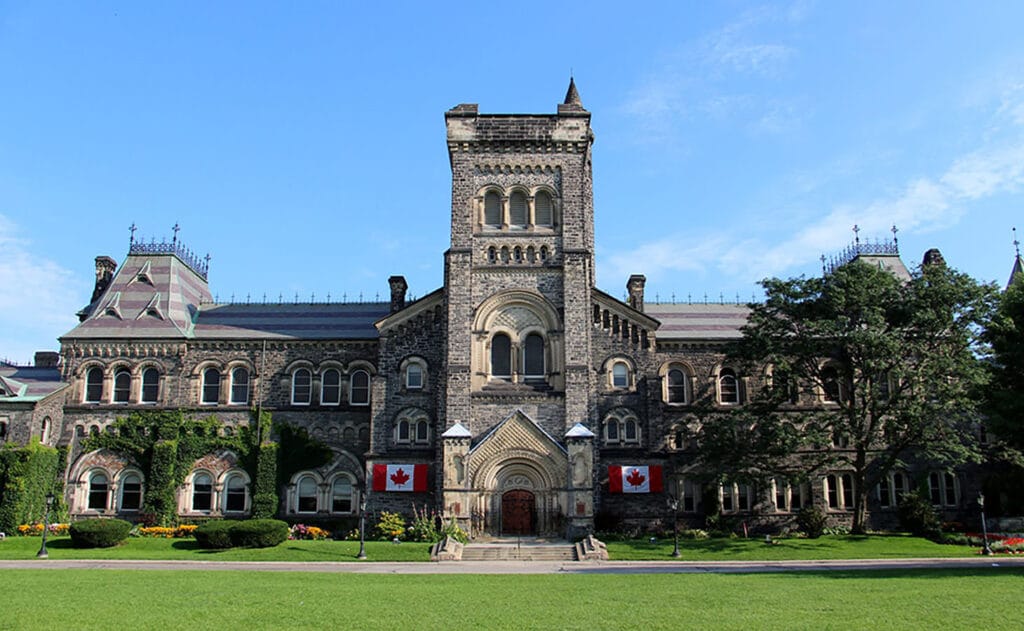Ranked 4th globally for education, Canada beckons with top universities and welcoming communities. Experience affordability, academic rigor, and a diverse, inclusive environment. Plus, post-graduation opportunities abound, allowing you to launch your career in a thriving job market. Explore Canada – your path to academic excellence and career success awaits.
World-Renowned Education in a Vibrant Country
Canada is a global leader in education, offering a diverse landscape of top-ranked universities and colleges. Recognized for their high-quality curricula, innovative teaching methods, and emphasis on experiential learning, Canadian institutions provide students with a comprehensive and enriching educational experience.
Key Advantages:
- Globally recognized degrees: A Canadian degree opens doors to career opportunities worldwide and is highly valued by employers.
- Holistic education: Canadian programs focus not only on subject knowledge but also on developing essential skills like teamwork, communication, critical thinking, and leadership.
- Wide range of options: Over 90 public universities and 20+ private universities offer more than 15,000 study programs across various fields, ensuring you find the perfect fit.
- Accessibility: English is the language of instruction in most universities, though French-language options exist. Community colleges offer affordable alternatives for undergraduate studies.
- Flexible pathways: Associate degrees provide a two-year option for entering the third year of a bachelor’s program.
- Research excellence: The U15 group, comprising Canada’s top research-intensive universities, fosters innovation and offers advanced research opportunities for postgraduate studies.
Top Canadian Universities
Choosing the right university is a crucial step in your academic journey. To help you navigate the landscape of Canadian excellence, we’ve compiled a list of top universities based on two prestigious rankings: QS World University Ranking 2024 and THE Ranking 2023.
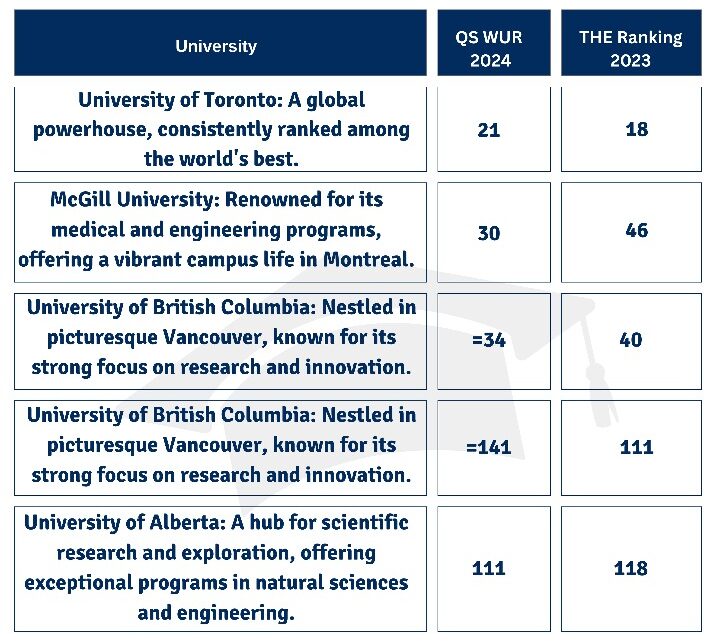
| University | QS WUR 2024 | THE Ranking 2023 |
|---|---|---|
| University of Toronto | 21 | 18 |
| McGill University | 30 | 46 |
| University of British Columbia | =34 | 40 |
| Université de Montréal | =141 | 111 |
| University of Alberta | 111 | 118 |
Understanding Course Fees and Living Costs in Canada
Planning your studies in Canada requires understanding associated costs. Here’s an overview of tuition fees and living expenses to help you prepare:
Tuition Fees:
- Undergraduate: The average annual tuition fee for international students in 2022-2023 was CAD 36,123.
- Graduate: Fees vary based on program type and level. Master’s programs range from CAD 6,210 to CAD 43,990, with thesis/project options around CAD 9,396. PhD programs typically cost between CAD 2,500 and CAD 17,000 per year.
Living Costs:
- Average annual expenses: Estimate CAD 15,000 per year for basic living needs like housing, food, and transportation.
- Variations: Costs can differ significantly depending on city, lifestyle, and accommodation choices.
Remember:
- These figures are averages and may not reflect specific program or institution costs.
- Research individual universities and programs for accurate fee information.
- Scholarships and financial aid options can help manage expenses.
Planning your Canadian study adventure involves understanding associated costs. Here’s a breakdown of essential expenses to help you budget effectively:
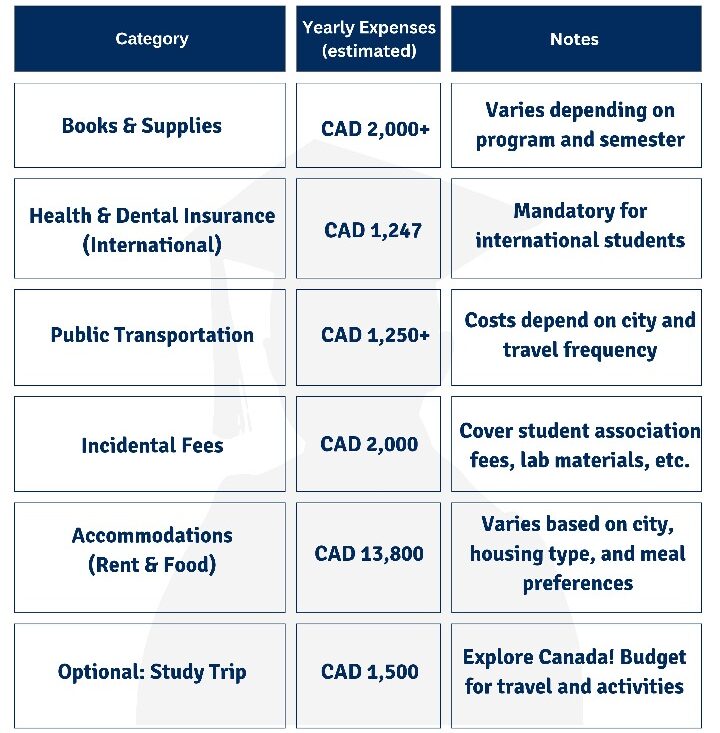
| Category | Yearly Expenses (estimated) | Notes |
|---|---|---|
| Books & Supplies | CAD 2,000+ | Varies depending on program and semester |
| Health & Dental Insurance (International) | CAD 1,247 | Mandatory for international students |
| Public Transportation | CAD 1,250+ | Costs depend on city and travel frequency |
| Incidental Fees | CAD 2,000 | Cover student association fees, lab materials, etc. |
| Accommodations (Rent & Food) | CAD 13,800 | Varies based on city, housing type, and meal preferences |
| Optional: Study Trip | CAD 1,500 | Explore Canada! Budget for travel and activities |
Exploring Scholarships in Canada
Studying in Canada offers a world-class education and a vibrant multicultural experience. However, understanding scholarship opportunities can help make your academic journey more affordable. Here’s an overview of some key scholarships in Canada, categorized by target group and reward:
Undergraduate Scholarships:
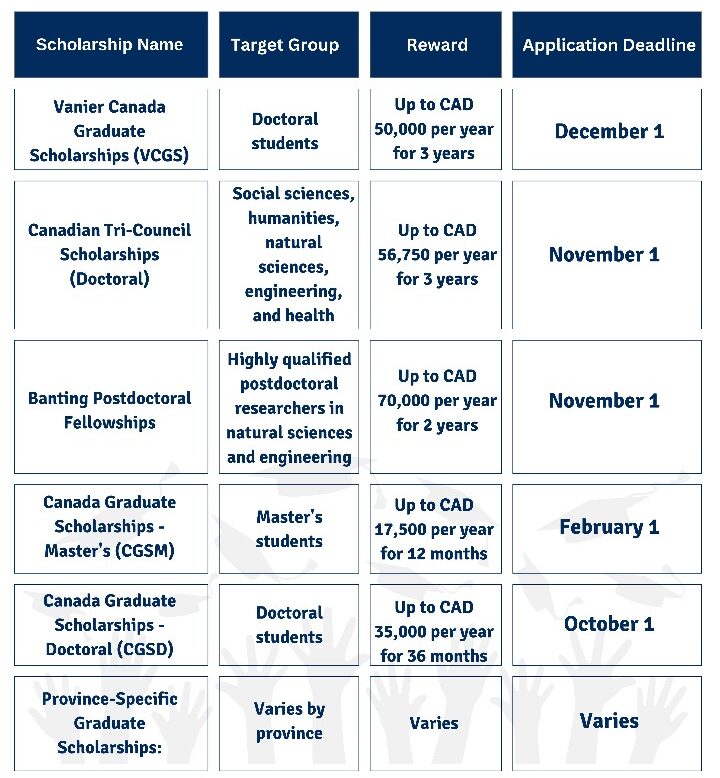
| Scholarship Name | Target Group | Reward | Application Deadline |
|---|---|---|---|
| Vanier Canada Graduate Scholarships (VCGS) | Doctoral students | Up to CAD 50,000 per year for 3 years | December 1 |
| Canadian Tri-Council Scholarships (Doctoral) | Social sciences, humanities, natural sciences, engineering, and health | Up to CAD 56,750 per year for 3 years | November 1 |
| Banting Postdoctoral Fellowships | Highly qualified postdoctoral researchers in natural sciences and engineering | Up to CAD 70,000 per year for 2 years | November 1 |
| Canada Graduate Scholarships - Master's (CGSM) | Master's students | Up to CAD 17,500 per year for 12 months | February 1 |
| Canada Graduate Scholarships - Doctoral (CGSD) | Doctoral students | Up to CAD 35,000 per year for 36 months | October 1 |
| Province-Specific Graduate Scholarships | Varies by province | Varies | Varies |
International Student Scholarships:
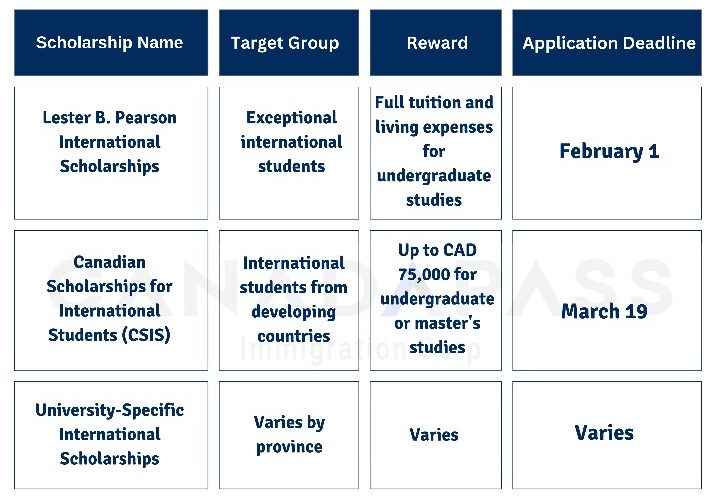
| Scholarship Name | Target Group | Reward | Application Deadline |
|---|---|---|---|
| Lester B. Pearson International Scholarships | Exceptional international students | Full tuition and living expenses for undergraduate studies | February 1 |
| Canadian Scholarships for International Students (CSIS) | International students from developing countries | Up to CAD 75,000 for undergraduate or master's studies | March 19 |
| University-Specific International Scholarships | Varies by university | Varies | Varies |
Additional Resources:
- Scholarships Canada: https://www.scholarshipscanada.com/Login/Login.aspx
- EduCanada: https://www.educanada.ca/scholarships-bourses/can/institutions/study-in-canada-sep-etudes-au-canada-pct.aspx?lang=eng
- Canadian Bureau for International Education (CBIE): https://cbie.ca/
Working Opportunities in Canada
Studying in Canada offers more than just academic excellence. It opens doors to valuable work experience and potential career pathways. Here’s an overview of work opportunities available to international students in Canada:
During your studies:
- On-campus jobs: Universities often offer part-time positions in libraries, cafeterias, administrative offices, and research labs. These can provide valuable work experience and income while you study.
- Off-campus work: International students with a valid study permit can work up to 20 hours per week during their regular semester and full-time during scheduled breaks (winter and summer). This allows you to gain experience in your field and potentially contribute to your living expenses.
- Co-operative education (co-op): Many Canadian programs integrate co-op placements into the curriculum, offering paid work experience in relevant fields. This can be a valuable asset to your resume and future job prospects.
- Internships: Many companies and organizations offer internship opportunities for international students, allowing you to gain practical skills and build professional connections.
Post-graduation:
- Post-graduation work permit (PGWP): International graduates who have completed a program of at least eight months duration may be eligible for a PGWP. This allows you to work in Canada for up to three years, gaining valuable experience and potentially transitioning to permanent residency.
Benefits of working in Canada:
- Gain practical experience: Working in Canada allows you to apply your academic knowledge in real-world settings, enhancing your skills and employability.
- Build your network: Through work experience, you can build professional connections with Canadian companies and individuals, potentially leading to future career opportunities.
- Explore career options: Working in Canada can expose you to various industries and career paths, helping you refine your professional goals.
- Contribute to your living expenses: Work income can help offset some of your living costs in Canada, making your studies more financially manageable.
Competitive Job Market and Earning Potential in Canada
Canada’s strong economy and focus on innovation present promising career prospects for international students. Here’s an overview of the job market and potential salary expectations:
Average Household Income:
- Canada boasts a higher average disposable income than the OECD average, indicating a strong standard of living and potential for financial growth. The average disposable income per capita in Canada is CAD 46,000 annually, compared to the OECD average of CAD 41,000.
Salary Expectations for Degree Holders:
- The average annual salary for a bachelor’s degree holder in Canada was CAD 60,100 in 2022. However, this can vary significantly depending on the specific field of study and industry.
- Entry-level positions typically offer an average annual salary of CAD 50,915, while experienced graduates with several years of expertise can earn as high as CAD 126,564 annually.
A Thriving Hub for Research and Innovation
Canada has established itself as a global leader in research and development, attracting students and scholars from around the world. Here’s what sets the Canadian research landscape apart:
Significant Investment:
- Canada boasts a robust commitment to research, evidenced by its consistent increase in research and development (R&D) spending. From 2019 to 2020, Canada’s gross domestic expenditures on R&D rose 3.1% to reach $41.9 billion (adjusted for inflation).
- This substantial investment translates into diverse funding opportunities for students and researchers across various disciplines.
Leading-Edge Facilities:
- Canada is home to renowned universities, research institutions, and advanced laboratories equipped with cutting-edge technology and infrastructure.
- These facilities provide students with access to state-of-the-art resources and collaborative environments, fostering groundbreaking discoveries and advancements.
Collaborative Culture:
- Canada fosters a collaborative research culture, encouraging partnerships between universities, government agencies, and private companies.
- This collaborative approach creates a dynamic research ecosystem, allowing students to work alongside leading experts and gain valuable industry experience.
Focus on Emerging Fields:
- Canada recognizes the importance of emerging fields like artificial intelligence, biotechnology, and environmental sciences.
- Significant research investments are directed towards these areas, offering students the opportunity to be at the forefront of tomorrow’s advancements.
Benefits for International Students:
- Studying in Canada provides unique access to this vibrant research environment. Students can participate in ongoing research projects, gain valuable lab experience, and contribute to cutting-edge discoveries.
- This experience enriches academic learning, enhances employability, and opens doors to exciting career opportunities in both Canada and abroad.
A Safe and Thriving Environment for International Students
Canada’s reputation for safety, well-being, and inclusivity makes it a top destination for international students seeking a world-class education within a supportive and vibrant environment. Here are some key factors contributing to Canada’s appeal:
Exceptional Safety:
- Canada consistently ranks among the safest nations globally, with 78% of residents reporting feeling safe walking alone at night (OECD Better Life Index, 2023).
- Its ranking of 11th on the 2023 Global Peace Index further underscores its commitment to peace and stability.
Strong Social Support:
- Canada’s social fabric is woven with factors contributing to high well-being, as reflected in its 13th position on the 2023 World Happiness Report. These factors include low corruption, robust social support networks, and high levels of freedom.
- Its universal healthcare system and diverse, inclusive society further contribute to a sense of security and belonging for international students.
Top-Ranked Student Cities:
- Montreal, Toronto, Vancouver, Ottawa, and Quebec consistently rank among the top student cities in the world (QS Best Student Cities 2024).
- These cities offer thriving student communities, safe environments, and access to renowned universities, ensuring a smooth transition and enriching student experience.
Top Student Cities in Canada
Choosing a city to study in Canada can be exciting! Here’s a glimpse into some of the top student destinations, ranked by QS Best Student Cities 2024, along with their top universities:
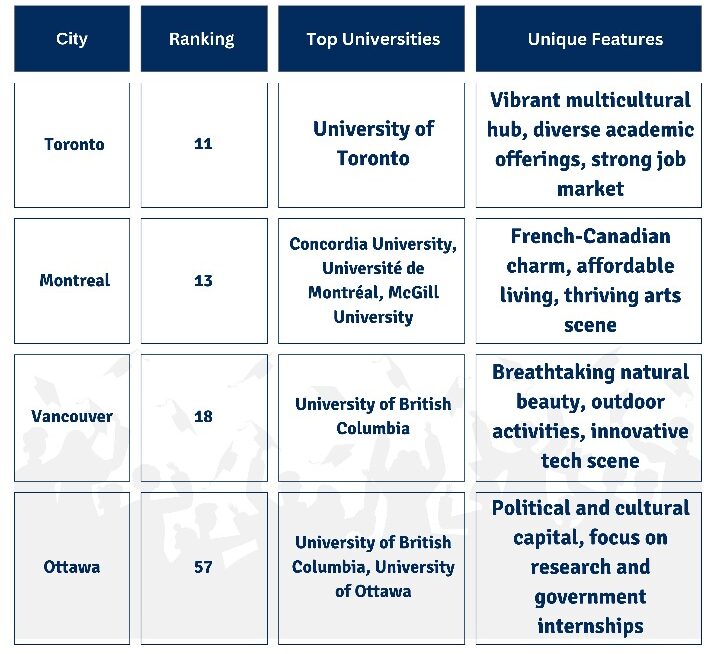
| City | Ranking | Top Universities | Unique Features |
|---|---|---|---|
| Toronto | 11 | University of Toronto | Vibrant multicultural hub, diverse academic offerings, strong job market |
| Montreal | 13 | Concordia University, Université de Montréal, McGill University | French-Canadian charm, affordable living, thriving arts scene |
| Vancouver | 18 | University of British Columbia | Breathtaking natural beauty, outdoor activities, innovative tech scene |
| Ottawa | 57 | University of British Columbia, University of Ottawa | Political and cultural capital, focus on research and government internships |
- Is Canada a safe country to live in? Canada is consistently ranked as one of the safest countries in the world, with a low crime rate and high quality of life.
- What is the weather like in Canada? Canada has a diverse climate, from the mild Pacific coast to the colder winter temperatures in the north. Choose a city that aligns with your weather preferences.
- What is the cost of living in Canada? Housing, food, and transportation costs can vary depending on the city you live in. Researching living expenses for specific locations is helpful.
- Is healthcare expensive in Canada? Canada has a universal healthcare system, so you will have access to basic medical care during your studies. Additional insurance may be needed for coverage beyond basic services.
- Is it easy to transfer credits from another university to a Canadian university? Yes, transfer credits are often possible, depending on the program and university policies. Contact the specific institution you’re interested in for more information.
- What are the job prospects after I graduate in Canada? Canada has a strong job market and offers generous work permits for international graduates, making it easier to stay and build your career after your studies.
- What academic qualifications do I need to apply for Canadian universities? Typically, you’ll need good grades in your high school diploma and any relevant undergraduate degrees. Standardized test scores may also be required.
- What types of programs can I study in Canada? Canadian universities offer a vast array of programs, from traditional fields like engineering and medicine to cutting-edge areas like artificial intelligence and renewable
- Why should I choose Canada over other countries to study? Canada offers a world-class education, a safe and multicultural environment, affordable tuition compared to other top destinations, and diverse work and immigration opportunities.
- Is Canada expensive to study in? Tuition fees can vary depending on your program and university, but living costs are generally comparable to other developed countries. Scholarships and student loans can help manage expenses.
- Do I need a visa to study in Canada? Most international students require a study permit to study in Canada. The application process is straightforward, and information about specific documents and procedures is available on the Canadian government website.
- What language do I need to speak to study in Canada? Many programs are offered in English, but French is also spoken in parts of Canada. Language proficiency tests may be required for program applications.





